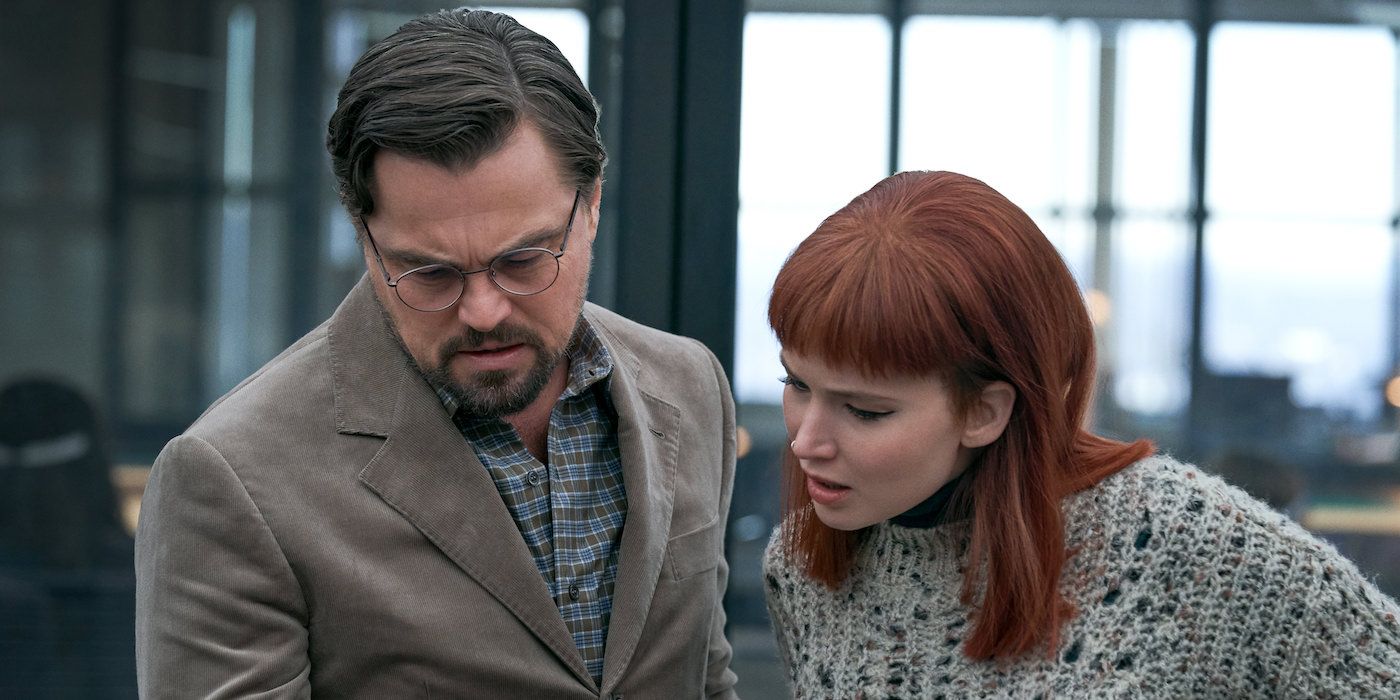Reviews for Academy Award winner Adam McKay's newest movie, Don't Look Up, have some odd irregularities in the way they're scored in Rotten Tomatoes compared to all his other movies. The Netflix political satire featuring a superstar cast, including Academy Award winners Leonardo DiCaprio, Jennifer Lawrence, and Meryl Streep is out in theaters and is drawing harsh reviews from critics before its Netflix debut.
McKay's rise to fame as a writer and director kicked off with Anchorman: The Legend of Ron Burgandy in 2004. He built on that success with a string of absurd, improv-driven comedies featuring Will Ferrell and (usually) John C. Reilly before shifting into a harder-hitting political satire dramedy with The Big Short and Vice, swapping his cast of comedy superstars for lineups of Oscar winners and nominees like Christian Bale, Sam Rockwell, Amy Adams, Brad Pitt, and more. Combined, Vice and The Big Short were nominated for 13 Academy Awards, including nominations for McKay for Best Picture, Best Director, and a screenplay nomination on both films, winning Best Adapted Screenplay for The Big Short.
Despite his career trajectory, reviews for Don't Look Up, McKay's first Netflix movie aren't so hot, earning him his second "Rotten" rating on the Rotten Tomatoes Tomatometer review aggregator. The Rotten score on its own is a deviation from his pattern of success, both for his frat-bro comedies and his Oscar-nominated political satires, but a closer look at the review data reveals a few anomalies, making Don't Look Up's Rotten Tomatoes scores truly perplexing.
Don't Look Up is Adam McKay's Worst Rotten Tomatoes Score (But Not Worst Reviewed)
Don't Look Up currently stands at a 55 percent critical score on Rotten Tomatoes through 146 reviews, tying with Step Brothers for McKay's worst Tomatometer rating. Despite the identical 55 percent score, Don't Look Up has a much better average review score at 6.2 out of 10 compared to Step Brothers' 5.6.
Don't Look Up's average review score is just 0.1 points below Anchorman: The Legend of Ron Burgandy, which has a Fresh 66 percent score, and only 0.2 less than Anchorman 2: The Legend Continues, which has a "Certified Fresh" score of 75 percent. This discrepancy between the Tomatometer and average review scores isn't uncommon, but it's usually exacerbated by polarizing movies, and looking at Metacritic's score breakdown (which splits reviews into three categories), 13 of their approved critics reviewed it positively while 19 were mixed and only 5 were negative, so, while a review of individual reviews in Rotten Tomatoes shows there is some polarization between Fresh and Rotten reviews, it's likely not significant enough to be the culprit.
Since Rotten Tomatoes' scoring system only factors whether a score is Fresh or Rotten, but not how high or low it is, the score simply indicates that only 55 percent of critics had a favorable view of the movie, even if the 6.2 out of 10 average is in-line with some of McKay's higher scoring films. The function of the score makes sense, as most audience members referencing Rotten Tomatoes may be more interested in whether or not people like it or dislike it than they are in just how positive the Fresh reviews are, but it does obfuscate a lot of nuance in the score in some situations like Don't Look Up, to the point that the way the score is presented may be less-than-helpful in this case.
Don't Look Up's Rotten Tomatoes Top Critic Score Doesn't Make Sense
If Don't Look Up's Rotten Tomatoes critic score is a little wonky compared to the actual review averages, the scores given by Rotten Tomatoes' designated "Top Critics" are even more confusing. The split between All Critics and Top Critics on Don't Look Up is slightly more than typical with a 7 point lower 48% on the Tomatometer, but average reviews actually went up 0.1 points to 6.3 out of 10, which on its own isn't that odd, but as we look closer at the data and compare to his other movies, the scoring system doesn't make much sense.
Don't Look Up's 6.3 average review score from Top Critics is higher than the average review scores given by Top Critics for four other Adam McKay movies, including Anchorman: The Legend of Ron Burgandy, which scored a 17-point higher Fresh 65 percent, and Anchorman 2: The Legend Continues, which scored 23 points higher at 71 percent, and was certified Fresh. It's also only 0.2 points lower than the average review score for Talladega Nights: The Ballad of Ricky Bobby, which had the same Top Critic Tomatometer score as Anchorman 2 and was also Certified Fresh. The average review score is also tied with Vice, which only has a 7 point higher Top Critics Tomatometer score, but both of those movies fall outside the trend established by his comedies.
While the kind of comedies Will Ferrell stars in generally earn lower scores from Top Critics than they do from All Critics, McKay's Ferrell features saw a surprising amount of consistency between both classes of Rotten Tomatoes critics, with the difference between their respective scores only varying 0.1 points up or down on average review scores for every movie but Anchorman 2: The Legend Continues, which Top Critics scored four points lower at 71 percent instead of the 75 percent from All Critics, and actual review scores averaging just 0.2 points lower at 6.2 out of 10 instead of 6.4 from All Critics.
This trend changed when McKay shifted to his Oscar-nominated movies. The Big Short saw the lowest variance, with only a four-point Tomatometer difference (85 percent versus 89 percent) and a .3 point difference in average review score (7.5 versus 7.8), but the split grew with Vice, where the 65 percent Fresh score from all critics saw a ten-point drop to 55 percent for Top Critics, with average reviews dropping 0.4 points from 6.7 to 6.3. This difference is fairly typical from Top Critics, but it's totally inconsistent with their scores for McKay's previous movies, such as Anchorman 2: The Legend Continues, which scored 16 points higher than on the Tomatometer despite a slightly lower average review score.
Why Don't Look Up's Rotten Tomatoes Score is So Different From Adam McKay's Other Movies
This kind of anomaly can sometimes draw conspiracy theories, so it's important to note that when we look at the behavior of a group of critics, we're not looking at their behavior as a group, but how their individual behaviors collectively influence group trends. Based on the way Adam McKay's earlier movies were reviewed by Rotten Tomatoes' Top Critics compared to his later movies, and the fact that the shift isn't nearly as drastic for all Rotten Tomatoes critics (or audience scores), it's safe to say the data suggests Top Critics aren't using the same standards for all his movies.
It's not uncommon for a filmmaker with a history of well-reviewed movies to make a poorly-reviewed movie, so this isn't to say the reviews for Don't Look Up are wrong, but simply that they're inconsistent. But there are a few differences with Don't Look Up from McKay's other political satires worth noting as well. First, it's an original story. The Big Short and Vice were based on actual people and events, and The Big Short was even adapted from an existing story, while Don't Look Up is entirely fictional, only using current events and figures to inspire the characters and story, which can be harder to execute since audiences don't immediately buy the premise as they would for something based on actual events. Second, Don't Look Up is the only Netflix movie in McKay's filmography.
There's still a bit of a stigma surrounding original streaming movies with a number of big filmmakers like Steven Spielberg, Christopher Nolan, Denis Villeneuve, and Patty Jenkins have said disparaging things about streaming movies, with Spielberg saying they should qualify for Emmy nominations instead of the Academy Awards, and Patti Jenkins saying "they look like fake movies." While that doesn't necessarily mean any reviewers are out to penalize Netflix content (which they haven't done for previous Netflix Oscar bait), that subconscious opinion can still influence scoring, which could explain why reviews for a theatrically released Will Ferrell comedy from McKay with a 6.2 out of 10 average review score would get a 71 percent fresh score from critics, while his political satire with a cast full of Oscar winners and nominees could see a 6.3 out of 10 average review score and yet only see 48 percent on the Tomatometer.
The most logical answer is Top Critics are simply less forgiving of Oscar bait because by its nature it's asking to be taken more seriously. A movie like Talledega Nights: The Legend of Ricky Bobby isn't going to be judged more on entertainment value since that's all it advertises itself as (despite a cast including previous oscar nominees John C. Reilly, Sacha Baron Cohen, Michael Clarke Duncan, and Amy Adams). On the other end of the spectrum, a political satire with a big climate change metaphor written and directed by Adam McKay following one of the most nominated movies of 2018 featuring Leonardo DiCaprio, Jennifer Lawrence, Meryl Streep, Jonah Hill, Cate Blanchett, Mark Rylance, Timothée Chalamet, and more, exists in an entirely different sandbox. Don't Look Up also got limited theatrical release before it hits the streaming platform, which is as good as an announcement for reviewers to evaluate it as one of the movies the Netflix will be pushing come awards season.
So what does this say about the reliability of Rotten Tomatoes or the relevance of Rotten Tomatoes' Top Critics? On one hand, knowing the context helps clear up some answers about the discrepancy in the score, but on the other hand, that context isn't easily available in the data presented by Netflix, and may not even matter to Rotten Tomatoes' core audience of more casual moviegoers. The score simply tells audiences it's "Rotten," but not whether that's simply because critics don't like it as an awards contender, but they might enjoy it on the same level as something like Anchorman, or if it's just unenjoyable across the board. Looking at the 75 percent audience score and 6.2 out of 10 average scores suggests the movie is being enjoyed by at least a portion of the audience, but even if Rotten Tomatoes visitors put in that much work, there's still no way to know which scores they're likely to align with, although anyone putting in that much effort in the first place is likely interested enough to check it out. Either way, both of those situations just go to show how unhelpful Don't Look Up's Rotten Tomatoes data is. In this case, and in many others, Rotten Tomatoes needs to include greater transparency and better presentation of how these scores break down.




